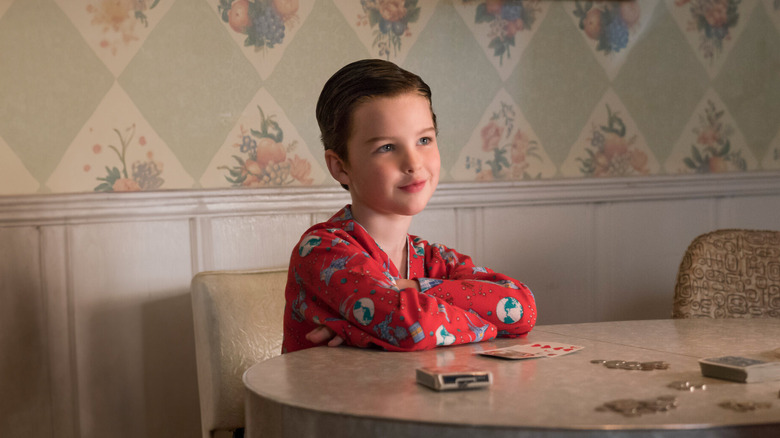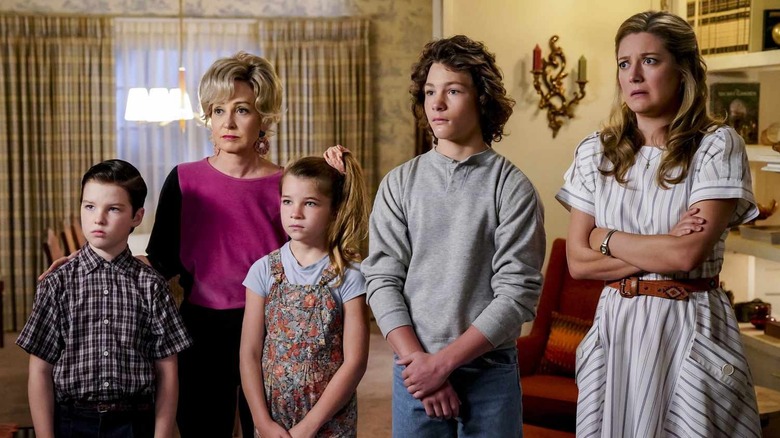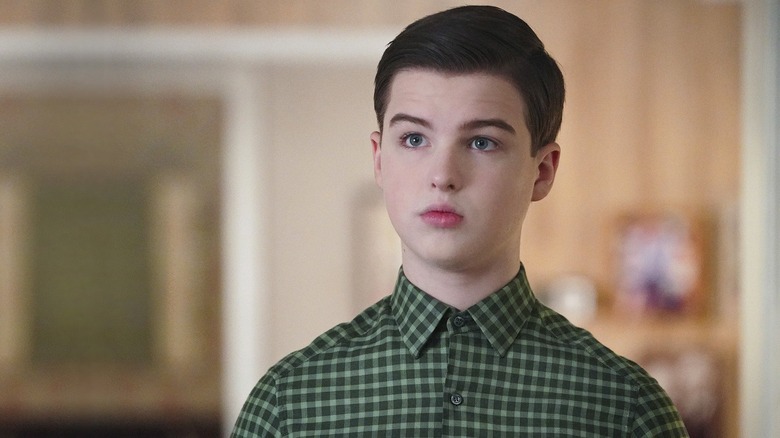Why The Big Bang Theory Spin-Off Young Sheldon Was Really Made
We may receive a commission on purchases made from links.
I've said it before, and I'll say it again: These days, pop culture as a whole is a snake eating its own tail — or, if we're being fancy, an "ourobouros," an ancient symbol depicting exactly that which represents the circular nature of time. Everything is getting revived. The "Jurassic" franchise is on its, like, ninth sequel (which now personally offends me because I finally watched "Jurassic Park" for the first time, and it's perfect). "The Big Bang Theory" is creating its own cinematic universe (the BBTCU, if you will?) with spin-offs like "Young Sheldon," "Georgie & Mandy's First Marriage," and the forthcoming series led by Kevin Sussman, "Stuart Fails to Save the Universe." As it happens, Chuck Lorre — the sitcom megaproducer behind the three titles I just listed — talked about this at the Banff World Media Festival in Canada.
"I don't want to be engaged in exploiting IP. That's bulls***. That's just trying to make money or something I've done quite well at," Lorre said (via The Hollywood Reporter), which seems like a frankly crazy thing to say when you consider that he keeps expanding the IP of, well, "The Big Bang Theory." Still, he qualified that thought with this sentiment: "What I want to do is make a good show, you know, and there's a good show to be made that is exciting and fun to work on, and will provide laughter,"
Beyond that, Lorre shared how the first spin-off of "The Big Bang Theory," titled "Young Sheldon" — which centers around Jim Parsons' Sheldon Cooper, but young and played by Iain Armitage — came into existence. "I don't know if you're allowed to say his name anymore, but I walked in Les Moonves' office about 10 years ago and said, 'I have an idea for a show about Sheldon when he's 10 years old in East Texas.' And he went, 'Go do it, now.'" (Moonves, the now-former CEO of CBS, stepped down after allegations of sexual misconduct in 2018, which explains Lorre's hesitance to talk about him.)
Still, Lorre is pragmatic about the entire thing. "You never get a green light because it's deep," Lorre said bluntly. "You get a greenlight because they think they can make a profit." Okay, that all tracks ... but in an oral history of "The Big Bang Theory," Lorre and a few other folks tell a different story about the inception of "Young Sheldon."
According to a book about The Big Bang Theory, Jim Parsons helped come up with the idea for Young Sheldon
In Jessica Radloff's 2022 book "The Big Bang Theory: The Definitive, Inside Story of the Epic Hit Series," former Warner Bros. executive Peter Roth told the author that, back in 2016, he got an auspicious call from Chuck Lorre. "[Chuck] said, 'I wanna give you an idea that I'm excited about, but I want to reserve my judgment until I hear from you.' He pauses. 'Young Sheldon. Sheldon at age eight,'" Roth recalled. "I remember literally leaping out of my chair and saying, 'That is f***ing brilliant.' CBS had the exact same reaction."
After that, though, Roth revealed that Jim Parsons helped come up with the entire concept. As he put it:
"It was only later that I was told the idea came from Jim Parsons. I was very surprised and delighted that Jim came up with such a brilliant idea, only because as many other roles as Jim will have — because he's such a gifted actor — he will always be associated with Sheldon. So to have exploited that in a way that is not too taxing but still rewarding is pretty brilliant, I thought."
Let's turn now to Lorre, who said that Parsons happened to have a nephew named Michael that was a child prodigy in Houston, and Parsons sent a recording of the young boy doing an in-depth science presentation. Lorre immediately understood that the kid was a genius, and apparently, Parsons asked if this could be the inspiration for a new show.
"And I thought, if we're going to do a prodigy, we have one!" Lorre exclaimed before pointing out that fans of "The Big Bang Theory" already know everything there is to know about Sheldon's family, his extensive education, and just generally who he is. "We know so much about Sheldon as a grown-up, why not take this idea and make the show about a character we already knew," Lorre continued.
"We didn't have to invent a new show about a brilliant, little boy; we had a brilliant, little boy! We just had to do a time-machine show," Lorre said triumphantly. He called his "Big Bang Theory" colleague Steve Molaro, who ultimately served as the showrunner for "Young Sheldon," right away, and the rest is history.
There was some disagreement over how to shoot Young Sheldon
Something notable about "Young Sheldon," particularly when you compare it to "The Big Bang Theory," is that it's a single-camera show instead of a multicam show. What this means, if these terms aren't super familiar to you, is that "Young Sheldon" is not shot in front of a live studio audience ("Big Bang" was), there's no laugh track ("Big Bang" had one), and obviously, there's just the one camera, which creates an effect more akin to, say, a movie or TV drama instead of a "classic" sitcom. (With multiple cameras, you can, of course, capture the same scene from a bunch of different angles, which is why it's been a sitcom staple for so long; if you do use a studio audience, it lets editors pick the best angle without making the actors do the same take over and over and over again.)
As Peter Roth told Jessica Radloff, Chuck Lorre was determined to use a single-camera approach for "Young Sheldon," and initially, nobody agreed with him — especially Roth. "I was probably the most skeptical once we began the process because we did it as a single-camera comedy, which I did not want to do," Roth recalled. "I wanted to do it as a multicam for a lot of reasons, mostly because I did not want the audience to be thrown out of the picture."
Eventually, Roth made an admission. "I was completely wrong about that," he said. "And Chuck argued the exact opposite point. He kept saying, 'No, we've got to offer something that's uniquely, distinctively different.' And he was right." (Plus, as Roth correctly said, shooting with young actors like Iain Armitage sort of requires single-camera due to, you know, child labor laws.)
Even Jim Parsons was a little confused by Lorre's insistence on single-camera. "When we first started talking about it, I just assumed Chuck and Steve [Molaro] would do a multicam, and I was astounded when they told me they weren't," Parsons confessed. "I would even say I was borderline disappointed in a weird way. I guess I had assumed I would be able to drop by tapings occasionally and talk to the audience — especially as we're finding our feet."
"But they wanted it to be its own thing, and filming it as a single cam was part of doing that, which was so smart," he admitted. "And it's allowed Steve to cultivate more heartfelt moments that he's really talented at, especially with these characters that he knows so well."
"The Big Bang Theory" and "Young Sheldon" are both streaming on HBO Max (and the latter is also on Netflix).


